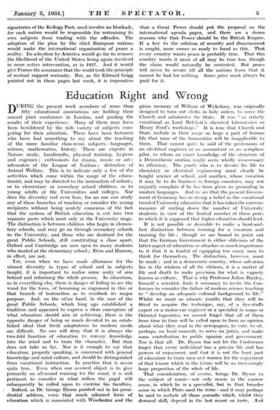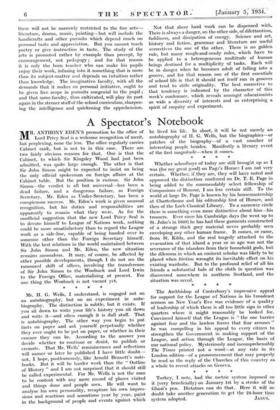Education Right and Wrong D URING the present week members of
more than fifty educational associations are holding their annual joint conference in London, and pooling the results of their experience. Many of them may have been bewildered by the rich variety of subjects com- peting for their attention. There have been lecturers who have had something to say about the teaching of the more familiar class-room subjects—languages, science, mathematics, history. There are experts in Nature study, handicrafts, physical training, hygiene and eugenics ; enthusiasts for drama, music or art ; advocates of the League of Nations ; defenders of Animal Welfare. This is to indicate only a few of the activities which come within the range of the educa- tionist, and may be directed to the instruction of infants, or to elementary or secondary school children, or to young adults at the Universities and colleges. Nor does the diversity end even here, for no one can study any of these brandies of teaching or consider the young recipients without being acutely conscious of the fact that the system of British education is cut into two separate parts which meet only at the University stage. The distinction is between children who begin in elemen- tary schools, and may go on through secondary schools to the University, and those who are destined for the great Public Schools, still constituting a class apart. Oxford and Cambridge are now open to many students who started at the elementary school ; Eton and Harrow, in effect, are not.
Yet, even when we have made allowance for the Utmost diversity in types of school and in subjects taught, it is important to realize some unity of aim behind and informing the whole process. In education, as in everything else., there is danger Of failing to see the wood for the trees, of becoming so engrossed in this or that branch of instruction as to overlook its major purpose. And, on the other -hand, in the case of the great Public Schools, which long ago established a tradition and appeared to express a clear conception of what education should aim at achieving, there is the apposite danger of being so much devoted to an estab- lished ideal that fresh adaptations to modern needs are difficult. No one will deny that it is always the two-fold function of education to convey knowledge into the mind and to train the character. But that does not take us far. Nor is it enough to say that education, properly speaking, is concerned with general knowledge and mind culture, and should be distinguished from vocational instruction. In practice that is never quite true. Even When our avowed object is to give primarily an all-rotind training for the mind, it is still pertinent to consider in what milieu the pupil Will subsequently be called Upon to exercise his faculties.
Indeed, as Dr. George Dyson pointed out in his presi- dential address, even that Muth admired ,form of education which is associated with Wineheiter and the pious memory of William of Wykeham, was -originally designed to turn out clerks in holy orders, to serve the Church and administer the State. It was "as strictly vocational as Lord Melehett's chemical laboratories or Henry Ford's workshops." It is true that Church and State include in their range so large a part of human life that none of the humanities will be inapplicable to them. That cannot quite be said of the professions of an electrical engineer or an accountant or an aeroplane pilot, to whom an exact knowledge of the structure of a Demosthenic oration might seem wholly unnecessary to efficiency. The youth who is to devote his life to chemistry or electrical engineering must clearly be taught science at school, and another, whose vocation it may be to do business in foreign countries, may not unjustly complain if he has been given no grounding in modern languages. And we see that the present Govern- ment of Germany has so strong a belief in the vocational trend of University education that it has taken the extreme measure of cutting down the number of University students in view of the limited number of those posts. to which it is supposed that higher education should lead.
It is not possible or desirable to make a hard-and- fast distinction between training for a vocation and training for life ; though we are bound to point out that the German Government is either oblivious of the latter aspect of education or attaches so much importance to it that it is fearful of equipping too many men to think for themselves. The distinction, however, must be made ; and in a democratic country, whose salvation lies in the wisdom of all the citizens, it is a matter of life and death to make provision for what is vaguely known as culture. That is why Professor Julian Huxley, himself a scientist, finds it necessary to invite the Con- ference to consider the failure of modern science teaching to "develop an adequate cultural background to life." Whilst we must so educate youths that they will be fitted to acquire the technique, say, of a dye-stuffs expert or a -motor-car engineer or a specialist in soaps or Oriental tapestries, we cannot forget that all of them from time to time will be called upon to form an opinion about what they read in the newspapers, to vote, to sit, perhaps, on local councils, to serve on juries, and make some -contribution to public opinion and government. Nor is that all. Dr. Dyson has not 'let the Conference forget that every individual has a private life and has powers of enjoyment, and that it is not the least part of education to train men and women for the enjoyment of that leisure which in the future will be an increasingly large proportion of the whole of life.
'That consideration, of course, • brings Dr. Dyson to the subject of music—not only music in the narrotv sense, in which he is a specialist, but in that broader sense in which Plato used the term—and it may perhaps be said to include all those pursuits 'which, whilst they demand skill, depend in the last resort on taste, And these will not be narrowly restricted to the fine arts--. literature, drama, music, painting—but will include the handicrafts and other pursuits which depend much on personal taste and appreciation. But you cannot teach poetry or give instruction in taste. The study of the arts is promoted rather by example than precept, by encouragement, not pedagogy ; and for that reason it is only the born teacher who can make his pupils enjoy their work, infusing into it something that is more than its subject-matter and depends on intuition rather than knowledge. The imaginative faculty, with all the demands that it makes on personal initiative, ought to be given free scope in pursuits congenial to the pupil ; and that same faculty, thus cultivated, will play its part again in the sterner stuff of the school curriculum, sharpen- ing the intelligence and quickening the apprehension. - Not that sheer hard work can be dispensed with. There is always a danger, on the other side, of dilettantism, faddinesS, and dissipation of energy. Science and art, history and fiction, grammar and literature are useful correctives the one of the other. There is no golden rule, but many rough-and-ready rules, which have to be applied to a heterogeneous multitude of human beings destined for a multiplicity of tasks. Each will be in danger when he becomes adult of falling into a groove, and for that reason one of the first essentials of school life is that it should not itself run in grooves and tend to stifle originality. The best corrective to that tendency is indicated by the character of this week's conference, which reveals amongst educationists so wide a diversity of interests and so enterprising a spirit of enquiry and experiment.







































 Previous page
Previous page